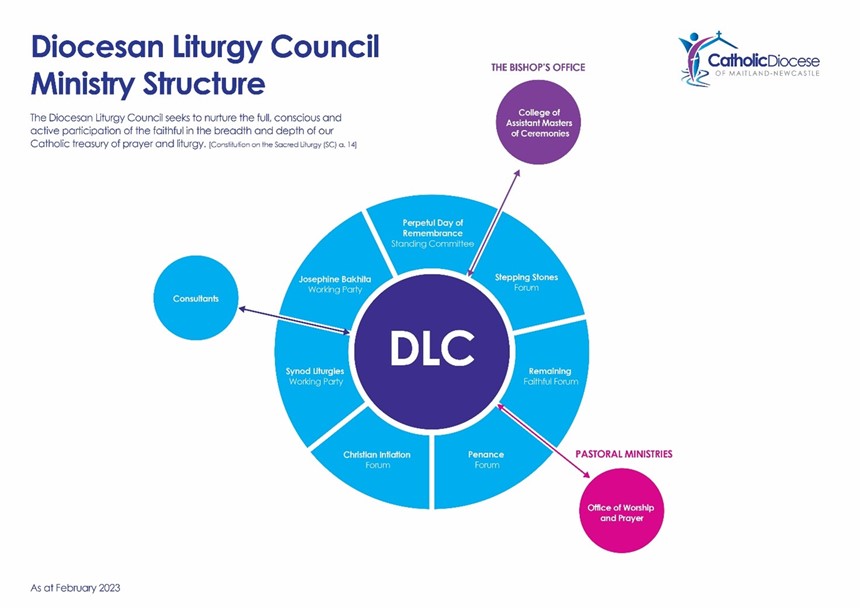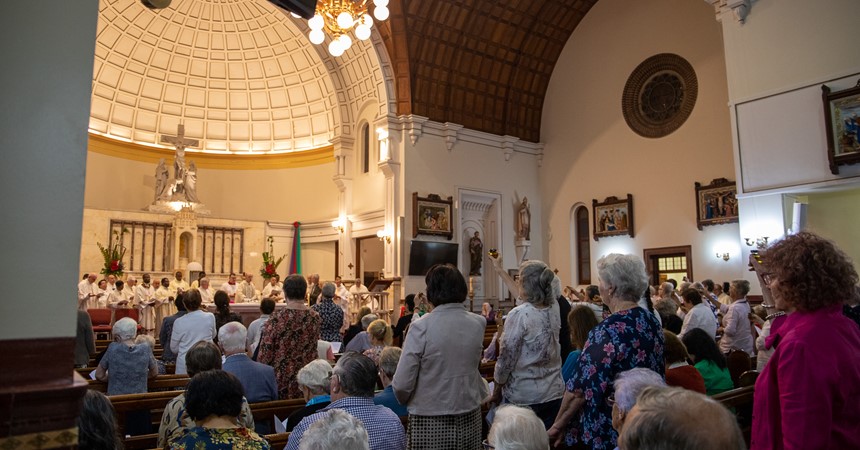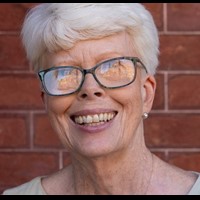Introduction
The church of Maitland-Newcastle is blessed with a rich liturgical life that stands on the shoulders of those who have gone before us.
Our Bishop Toohey, who participated in the Second Vatican Council, encouraged the changes the Council mandated for the liturgy. The Council clearly articulated the essential link between liturgy and church, giving fresh impetus to the traditional understanding that the liturgy, and most significantly, the Eucharist makes the church. The Council put it this way in The Constitution on the Sacred Liturgy (CSL) (a.1)
This sacred Council has several aims in view: it desires to impart an ever-
increasing vigour to the Christian life of the faithful; to adapt more suitably
to the needs of our own times those institutions which are subject to
change; to foster whatever can promote union among all who believe in
Christ; to strengthen whatever can help to call the whole of mankind into
the household of the Church. The Council therefore sees particularly
cogent reasons for undertaking the reform and promotion of the liturgy.
Fr John Woods and our Clare Tobin rsj were champions of the liturgical renewal in our diocese. I am lucky to be one of the many who were shaped and encouraged by their inclusive passion, deep knowledge, and understanding.
The liturgical life of our church has also been shaped by the presence and ministry of Fr Richard Lennan, who has always invited us to stand on and live from a solid theological foundation. At the first session of our most recent Synod he gave us a wonderful framework for renewal; learning – unlearning – relearning. This is a most helpful frame for a community called to the lifelong conversion and renewal that marks the DNA of all disciples and the church community as one body.
We have been blessed with many others along the way who have, and continue to, minister in the many parts of this church: in schools, parishes, the diocesan offices.
Those of us who have the privilege of ministering and serving in the liturgical life of our church of Maitland-Newcastle are the inheritors of this rich story and it is now our responsibility, as others have done for us, to hand it on in a way that tries to future-proof liturgical ministry in our church. I think the wonderful experience of Bishop Michael Kennedy’s Installation demonstrated the richness of our diocesan liturgical life which, like us, is always in need of ongoing renewal.
Current Structures
Like all structures, liturgical structures and processes exist to serve the life and mission of the community and, in this case, specifically, the liturgical life of the church of Maitland-Newcastle, as celebrated in parishes, schools, and various communities that comprise some of the ‘many parts’ of this one diocesan body.
From time to time we also gather as the church of Maitland-Newcastle to mark our unity as ‘one body’. We’ve just had two such big diocesan liturgies: Bishop Michael’s Installation followed by the annual Chrism Mass. Earlier in the year we celebrated the Catholic Schools’ ‘Called to Serve’ Mass. Diocesan liturgical structures serve the celebration of the liturgy in all these places.
About these diocesan liturgies, the CSL says in a 41:
The bishop is to be considered as the high priest of his flock, from whom
the life in Christ of his faithful is in some way derived and dependent.
Therefore all should hold in great esteem the liturgical life of the diocese
centered around the bishop, especially in his cathedral church; they must
be convinced that the pre-eminent manifestation of the Church consists
in the full active participation of all God's holy people in these liturgical
celebrations, especially in the same eucharist, in a single prayer, at one
altar, at which there presides the bishop surrounded by his college of
priests and by his ministers.
The Constitution goes on to say in a 45 - 46:
… every diocese is to have a commission on the sacred liturgy under the
direction of the bishop, for promoting the liturgical apostolate …
Besides the commission on the sacred liturgy, every diocese, as far as
possible, should have commissions for sacred music and sacred art.
These three commissions must work in closest collaboration; indeed it will
often be best to fuse the three of them into one single commission.
Ideally, parishes and even schools would have some form of liturgical council or team which promotes the liturgical life of that particular community.
The Installation of our new Bishop provides us with an opportunity to outline our current liturgical structures once again so everyone is aware.
Diocesan Liturgy Council (DLC) and Groups
By and large, our diocese has always had a Diocesan Liturgy Council. That is a rare blessing these days once you move outside the metropolitan or capital city archdioceses.
The shape of our DLC has changed over the years in response to the circumstances of our Church. For more than eight years the Council has been establishing a range of groups in response to specific pastoral needs or questions. This mode of operating has increased the participation and wisdom brought to bear on issues. We have found that people are more open to being part of a group which is focused on something they are passionate about and which finishes when the task is done.
The Council seeks expressions of interest from people, across the diocesan community, with a passion and skill set that will bring wisdom to a particular issue. Each group is given a mandate that outlines their task and accountability to the DLC. The groups exist until the task is completed. Those indicated in the diagram below are the current groups associated with the DLC.

One of the most exciting developments in our diocesan liturgical ministry has been an initiative of Bishop Bill Wright who asked us to develop a ministry of Assistant Masters of Ceremonies. This ministry has been growing since 2018. There are four members of the now-established ‘College of Assistant Masters of Ceremonies’ (CAMC), and five people are currently engaged in a process of formation and discernment for this ministry. You may recall seeing a request for ‘Expressions of Interest’ in this ministry about eighteen months ago. The diagram shows that the CAMC is not a subgroup of the DLC. It sits alongside and is part of the Bishop’s Office.
The ministry of the DLC is further enriched by a group of ‘consultants’ who include other members of our diocesan community with particular areas of wisdom and expertise.
For more information about the DLC please visit the Council webpage where, amongst other things, you will find the Statutes and the annual Strategic Overview – 2023. The Strategic Overview articulates the liturgical principles and theological foundations which shape and critique diocesan liturgical ministry. These may assist parish and school liturgy councils and teams. They are also available as separate documents by clicking on the links.
The Council meets on the second Thursday of each month. On the Council webpage you will also find a report on each DLC meeting under the heading ‘Council News’.
Other dioceses recognise that we have a well-functioning DLC that thinks outside the traditional box and structures itself to best serve the Church at this time and in this place. For this reason we have been asked to facilitate a workshop on Diocesan Liturgy Councils at the upcoming National Liturgy Conference. As Fr Matthew Muller likes to say, this diocese punches above its weight in many areas of pastoral life.
Office of Worship and Prayer
Like all our diocesan councils the DLC is supported by an office that is part of the Pastoral Ministries Team. While the office serves the DLC, it also has a wider focus which is reflected in its name, ‘Worship and Prayer’ and is part of the five foundations of the diocesan plan.
Sharon Murphy is the Administrative Assistant and, this year after a long search, we have been joined by Fiona Duque who has taken on the position of Officer, Worship and Prayer.
However, unlike the other diocesan councils, the DLC, not the office, is advisory to Bishop Michael and the community. One of our aims this year is to grow the involvement of an ‘extended executive’ in furthering the work of the Council and the office.
The work of the Council and the office is also served by the combined ministry of Fr Andrew Doohan as Master of Ceremonies and myself, Louise Gannon rsj, as Manager Worship and Prayer. Together, we prepare many resources for the Council to consider and facilitate a range of formation opportunities.
Conclusion
Why is liturgy such an important part of Catholic life? Because as the CSL says in a. 14,
In the restoration and promotion of the sacred liturgy, this full and active
participation by all the people is the aim to be considered before all else;
for it is the primary and indispensable source from which the faithful are to
derive the true Christian spirit; and therefore pastors of souls must zealously
strive to achieve it, by means of the necessary instruction, in all their
pastoral work.
We celebrate the liturgy as the place of encounter with Christ where through the power of the Holy Spirit we are opened to be changed by word and sacrament into nothing less than the Body of Christ. The liturgy is not an end in itself, a weekly commitment that gets us to heaven. The liturgy exists to make us and remake us for mission.
The church of Maitland-Newcastle is one body with many parts that seeks to pursue God’s mission here and now. In liturgical ministry, diocese, parish and school are not alone, but rather lean into each other’s strengths so that the love of God will be proclaimed in this time and place and disciples will be baptised.
One Mission, One Body, Many Parts.
Follow mnnews.today on Facebook.

